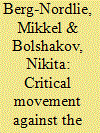| Srl | Item |
| 1 |
ID:
160205


|
|
|
|
|
| Summary/Abstract |
In 2010, Russian authorities presented a new draft law on education, which immediately became controversial. The essay examines whether user groups (parents) and low-ranking sector employees (teachers) were active in the movement critical of the reform, and how the state responded to the anti-reform movement. The movement consisted of several networks and organisations with no central node. It included teachers, parents and activists from both non-systemic groups and systemic opposition parties. Pressure from below by networks and organisations was combined with pressure from actors situated above in the political system, that is, in the Duma. Since the movement was welfare-oriented rather than fundamentally regime-critical, the Russian authorities tolerated open criticism both from civil society and inside the Duma. Some gains for teachers were won, but the movement’s proposed amendments and demands were generally rejected or only introduced in revised form.
|
|
|
|
|
|
|
|
|
|
|
|
|
|
|
|
| 2 |
ID:
190463


|
|
|
|
|
| Summary/Abstract |
This essay explores the changing shape of transitions from education to employment amongst deaf and hard-of-hearing (DHOH) youth in Russia. It draws on survey and interview data to show that, despite the formal institution of inclusive policies and legal frameworks at the state level, the choices open to DHOH youth remain heavily limited, and become narrower at each stage of their transitions to adulthood. This narrowing of horizons and attendant marginalisation stems from the ongoing salience of disabling, medical approaches to deafness; a lack of enabling practices or resources to support DHOH youth in the education system; and widespread discrimination from employers.
|
|
|
|
|
|
|
|
|
|
|
|
|
|
|
|